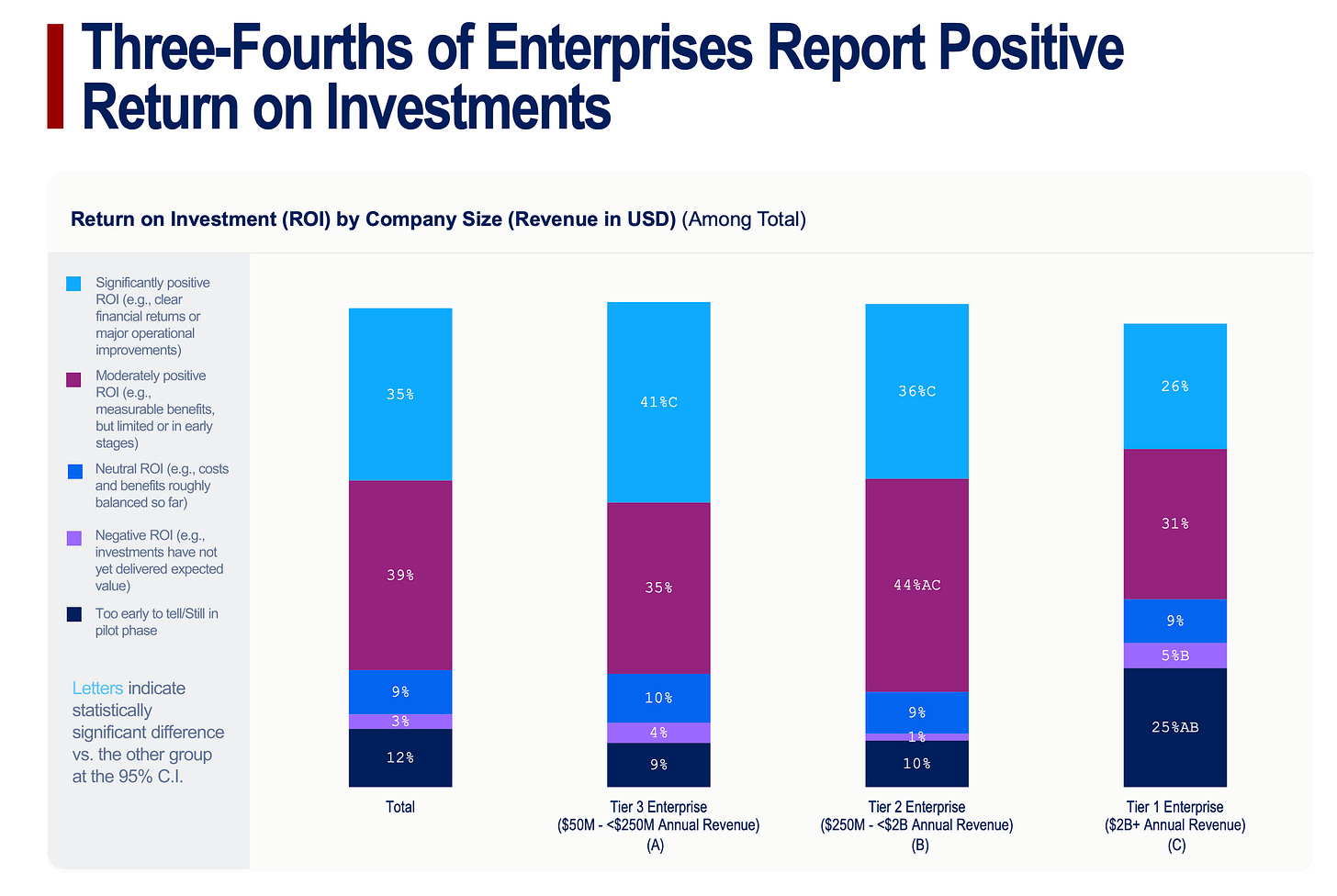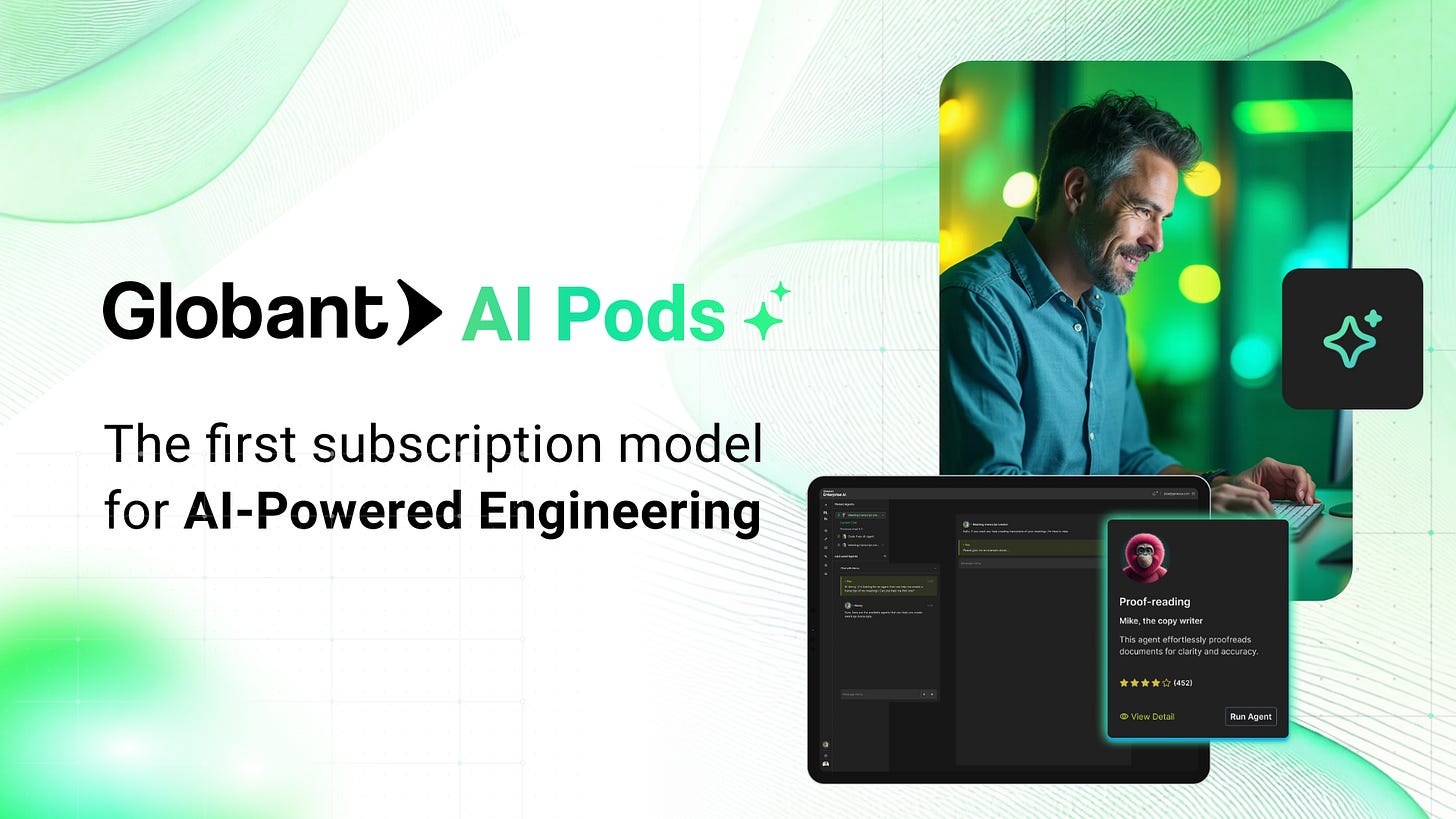Wait, Are 74% Of Businesses Actually Seeing An ROI From Generative AI?
A new Wharton study finds two thirds of businesses are actually seeing a positive ROI from generative AI. Is it a watershed moment?
For months now, AI watchers have been citing an MIT study that found 95% of businesses weren’t seeing an ROI from their generative AI spend. The study’s popularity seemed to confirm what many close to the technology felt to be true: It was difficult to implement, often unreliable, and disruptive enough to upend business processes and make things a mess.
These concerns may all be legitimate, but a new study from the University of Pennsylvania’s Wharton School complicates the narrative. The study found that 74% of businesses that measure the ROI from their generative AI efforts are already seeing a positive return, and more expect to see a positive ROI within the next two or three years.
“These results are more positive than I was expecting,” Wharton professor Stefano Puntoni, a study author, told me in a phone call this week. “People are finding this technology is powerful. So it’s not just hype.”
The Wharton study’s more positive findings stem, in part, from the broader set of use cases it considered. Where the MIT study looked at whether generative AI pilots made it into production and delivered a profit, Wharton’s incorporated a range of uses, including individual productivity, employee retention, and operational efficiency.
“Our definition is very different from the MIT report,” said Puntoni. “Theirs is much more stringent.”
The Wharton study doesn’t immediately refute the MIT report, but it does suggest that the tech industry’s rollout of generative AI won’t fit into a simple story. It’s yet another data point among many about a nascent technology’s viability. And even with its more positive results, it shows anything but a smooth and uniform rollout.
The Wharton report, for instance, shows jagged adoption of the technology, with some industries showing much greater enthusiasm for generative AI than others. Eighty-eight percent of respondents in tech and telecom said they were seeing at least a moderately positive ROI from generative AI technology, for instance, and 83% in banking and finance said the same. In retail, only 54% of respondents said they were seeing a positive ROI so far.
There were also divides by seniority. Eighty-one percent of VPs and above said they were seeing a positive ROI from the technology, while only 69% of those in manager or director jobs said the same. Middle managers, the Wharton study found, were twice as likely than VPs and above to say it’s too early to tell whether there’s a generative AI ROI or that they were still in pilot phase.
“Across several questions, several indicators, we often see more positive reactions to these Gen AI programs among very senior leaders than middle managers,” said Puntoni.
Smaller companies also tended to fare better with generative AI than massive companies. Only 57% of those with more than $2 billion in annual revenue said they saw a positive ROI so far. Box CEO Aaron Levie said the discrepancy was related to smaller companies’ ability to adapt faster.
“The amount of output you get from AI agents will be directly correlated to how much you change (or reset) your workflow,” Levie said. “Smaller companies definitionally can change their processes more easily or start from the ground up. This is clearly harder in big companies.”
The Wharton study is self reported, an important caveat, and includes responses from more than 800 people in U.S.- based companies with more than 1,000 employees and $50 million in revenue. It was done in partnership with the GBK Collective, a company that does some AI advising. Wharton paid for the study. GBK Collective partner Jeremy Korst, an author on the study, did not respond to an interview request.
For the generative AI boom to persist, the technology’s end users will need to find a clear return on their spending. Without that, all the infrastructure investment in the world won’t matter. And even then, the generative AI financial experiment’s payoff is far from guaranteed. “The numbers are so large,” Puntoni said. “I’m not in a position to say whether that makes any sense.”
The new era of capacity: Introducing Globant’s AI pods (sponsor)
AI is changing how every business operates, but scaling it safely and effectively still challenges most enterprises. In a recent Big Technology interview, Globant Co-founder and CEO Martín Migoya explained how the company is redefining AI delivery with a capacity-based approach.
That vision comes to life in Globant’s AI Pods, a subscription-based model that combines agentic AI with human oversight to deliver measurable business outcomes. Each Pod operates like a dedicated AI-augmented team: secure, composable, and continuously improving as new models emerge.
Built on Globant Enterprise AI, AI Pods give organizations predictable pricing, full IP ownership, and adaptive capacity that grows with demand. From automating workflows to orchestrating complex systems, it’s a new foundation for enterprise-scale AI, built for speed, safety, and sustained innovation.
Learn more about AI Pods: https://www.globant.com/ai-pods
Advertise with Big Technology?
Reach 150,000+ plugged-in tech readers with your company’s latest campaign, product, or thought leadership. To learn more, write alex@bigtechnology.com or reply to this email.
What Else I’m Reading, Etc.
Amazon’s massive Rainier AI data center is up and running in Indiana [CNBC]
Tennessee man spends month in jail over a Trump meme the sheriff didn’t like [WTVF]
The Times Of London called the wrong Bill Deblasio [Semafor]
Harvard students distraught over grade inflation claims [Harvard Crimson]
Profile of tech PR rep and AI critic Ed Zitron [Wired]
The secret behind bowhead whale longevity [New York Times]
Make LinkedIn your most powerful channel with Playbookz. 20k reach in 28 days or you don’t pay. [Playbookz] (Sponsor)
This Week On Big Technology Podcast: How AI Is Changing Writing — With Tony Stubblebine
Tony Stubblebine is the CEO of Medium. He joins Big Technology to discuss the future of writing in the age of AI and how platforms should handle AI-generated content. Tune in to hear fresh data on ChatGPT vs. Google referral quality, Gemini’s impact on click-throughs, and Medium’s anti-spam approach. We also cover Cloudflare AI blocking, creator payouts, and Medium’s writing app. Hit play for a candid operator’s view of what survives—and thrives—as AI floods the web.
You can listen on Apple Podcasts, Spotify, or your podcast app of choice
Thanks again for reading. Please share Big Technology if you like it!
And hit that Like Button if you feel like you got a good ROI from today’s newsletter!
My book Always Day One digs into the tech giants’ inner workings, focusing on automation and culture. I’d be thrilled if you’d give it a read. You can find it here.
Join our private Discord!
For daily, high-signal conversation about the lastest in AI. You can join at the link below:




